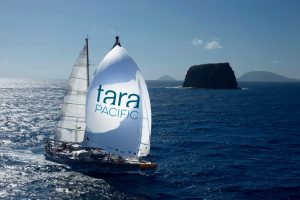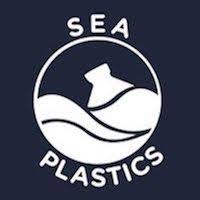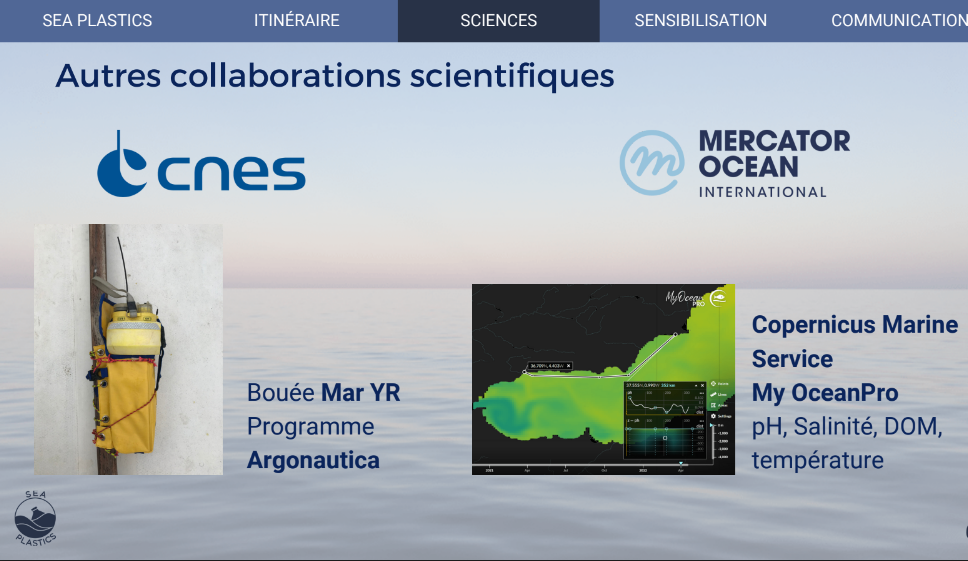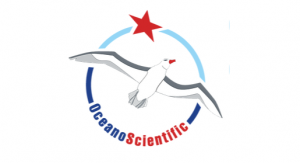Mercator Ocean supports NGOs working to protect and raise awareness surrounding the ocean. We mainly provide scientific data and expertise to three NGOs, namely, Children for the Oceans, Coral Guardian, and Sea Plastics at present, Emily Penn eXXpedition in the past. These partnerships have been developed in order to boost awareness about the ocean and marine environmental protection efforts. To better reach the general public, we help to develop and disseminate ocean literacy and societal awareness tools and materials.
Partnerships
Children for the Oceans
Since 2018, Mercator Ocean’s expertise and the Copernicus Marine Service data have been used to support Children for the Oceans (CFTO). This NGO was co-created by Thomas Lesage, a 14-year-old high-school student. He decided to take part in a training ship that went around the Atlantic Ocean and to deliver awareness sessions at schools located in the ports he was stopping by. When he came back to France, he decided to talk about what he had seen in the ocean and create a network of ocean ambassadors worldwide.
Focused on three different topics, acidification, overfishing and plastic contamination, Children for the Oceans had the help of Mercator Ocean scientific expertise to develop educational tools for these awareness sessions. Ocean ambassadors use plastic drift simulations in the ocean as well as explanation materials and visual aids to give accurate oceanographic information.
Thomas Lesage declared, “As a teenager, I believe that a community of motivated young people can convince adults to change their set ways of thinking and living: Our future is at stake and we deserve a future”. Each year, several awareness sessions are delivered. Further, Thomas participates in international conferences in order to convince policymakers to make the legislation about marine conservation more sustainable. Mercator Ocean International invited CFTO to various international events. The organisations collaborated for the World Oceans Day, the launch of the Blue Book for a Sustainable Ocean at the European Parliament and the European Space Week.
In 2022, the association has a second partner, Romain Pilliard’s Useitagain, to contribute to the promotion and development of the circular economy.
Discover Thomas Lesage’s work :
Coral Guardian
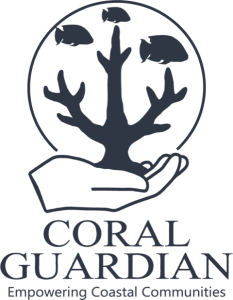 Coral Guardian is a non-profit organisation founded in 2012 by Martin Colognoli and Guillaume Holzer.
Coral Guardian is a non-profit organisation founded in 2012 by Martin Colognoli and Guillaume Holzer.
It aims to :
– the conservation of coral ecosystems,
– raising the awareness of as many people as possible,
– participation in scientific discoveries.
CORAL GUARDIAN aims to promote innovative approaches to marine conservation, using restoration techniques adapted to the local context of each project, while involving the local communities that depend directly on these ecosystems. CORAL GUARDIAN’s awareness-raising activities are aimed at the local communities where restoration projects are carried out, but also at the general public. They are deployed through a number of channels: creation and distribution of educational tools, communications on social networks and the association’s proprietary media (newsletter, websites, etc.), distribution of a photographic exhibition, publications and popularisation of scientific articles, etc.
CORAL GUARDIAN uses science to carry out scientific, biological and social monitoring, coral restoration projects, and research related to coral ecosystems and the threats they face.
The NGO has offices in France, Indonesia and Spain. The organisation has succeeded in planting more than 47,000 corals, raising awareness among more than 130,000 people in 5 years and developing activities of economic value in communities near the coral reef in Indonesia, creating 30 local jobs, and increasing the number of fish by 30.
Their moral principle is the quote by Benjamin Franklin, “Tell me and I forget. Teach me and I remember. Involve me and I learn”. Since early 2019, Mercator Ocean International has been a close scientific partner of the Coral Guardian educational project. They help the non-profit organisation by providing educational and scientific support. This includes the use of 2D representation of oceanographic parameters based on EU Copernicus marine service information on variables such as currents, temperature and temperature anomalies at the surface of the world ocean and in the Asian area, from MyOceanPro viewer.
The association has produced awareness-raising materials based on Copernicus Marine Service products and Mercator Ocean services.
Emily Penn eXXpedition
 Between 2018 and 2020, Mercator Ocean International sponsored the Emily Penn Round the World eXXpeditions. Emily Penn is an ocean advocate and sailor who has co-organised 12 sailing expeditions in the Atlantic and Pacific gyre in order to collect samples of plastic and toxic contamination and raise awareness about the problem of marine contamination. In 2014, she decided to create all-female expeditions to highlight the role of women in protecting the earth. The organisation built a global network of multidisciplinary women who can contribute to world-class scientific studies, explore solutions, and use their unique skill sets to tackle the problem from all angles.
Between 2018 and 2020, Mercator Ocean International sponsored the Emily Penn Round the World eXXpeditions. Emily Penn is an ocean advocate and sailor who has co-organised 12 sailing expeditions in the Atlantic and Pacific gyre in order to collect samples of plastic and toxic contamination and raise awareness about the problem of marine contamination. In 2014, she decided to create all-female expeditions to highlight the role of women in protecting the earth. The organisation built a global network of multidisciplinary women who can contribute to world-class scientific studies, explore solutions, and use their unique skill sets to tackle the problem from all angles.
The Round the World expedition 2019–2020 sailed through four ocean gyres and the Arctic to demonstrate and collect data about plastic contamination. The trip lasted 38,000 kilometres long and involved over 300 women.
Mercator Ocean International, using Copernicus Marine Service data, provided the eXXpeditions with a drift model of the movement of currents and plastics in the gyres. This model has been instrumental in sharing the story of plastic in the ocean with eXXpeditions’ network online. As underlined Penn herself, “The model, a clear visual aid based on real data, has been an essential tool for engaging with people and increasing their understanding of the movement of ocean plastic”.
Other NGOs supported
Mercator Ocean helps other NGOs by providing scientific data and information that are used to raise awareness and boost ocean literacy.
The Foundation Tara Océan Expedition has been one of our first partners. This scientific laboratory settled on a schooner has already travelled more than 540,340 kilometres on the ocean. Through 12 expeditions, Tara has collected 76,450 sea water samples, discovered 100,000 marine species and invited 60,000 children on board to learn about the ocean. To fulfil its awareness mission, Tara Expedition tries to convince decision makers that the ocean is a common responsibility.
Mercator Ocean International along with the Copernicus Marine Service has been one of the “co-pilots” of this epic adventure for many years since its maps and daily services have been used to chart Tara’s route in real time. More recently, in 2022 animations of essential ocean parameters, such as chlorophyll, have been provided for awareness-raising purposes on social networks, such as Instagram stories.
The association Sea Plastics was created in 2016 by students from AgroParistech. After many discussions with scientists, they realised that there was a lack of coherent data on micro-plastics. They decided to lead an expedition every year in the Mediterranean Sea to collect samples from a Mantra net in the sea depth to calculate the quantity of microplastics in the sea. During their trip, they also organised awareness-raising sessions regarding microplastics and their impacts.
Copernicus Marine Service products allow the crew to benefit from ocean forecast information to define the sampling context and make comparisons with data obtained from other experiments. It also enable the crew to use oceanographic forecast information obtained through a Router to locate the eddies.
In 2022, Mercator Ocean supported the expedition by sharing the MYOCEAN PRO tool. The crew members were trained by our Outreach team to make the most of the tool’s capabilities.
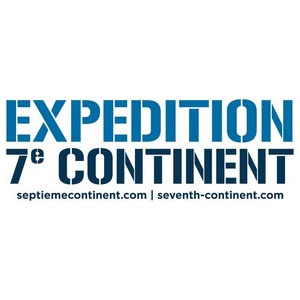
In 2014, Mercator Ocean International supported the 7e Continent Expedition. This non-profit organisation aims to build awareness among the general public, students as well as local industries and political stakeholders, regarding the devastating impact of plastic waste dispersion in the oceans. Their mission consists of going to the 7th continent in the Pacific Gyre in a sailboat equipped with an Argos beacon, to better understand the amount of plastic that has accumulated in this area.
Before the expedition, particle drift simulations made it possible to locate the convergence zone and therefore refine the boat’s course forecasts. Copernicus Marine real-time data maps have been used throughout the expedition to have information on the sea level and currents to guide the ship in the Pacific Gyre. In June 2022, Expedition 7th Continent is partnering with the Blue Odyssey Initiative, a science and technology-based expedition programme dedicated to the protection and preservation of underwater coastlines.
Oceano Scientific gathers financial and technical means to collect oceanographic data in remote marine areas where no research has been conducted. Their aim is to discover more about the atmosphere-ocean interactions by leading sailing expeditions. The organisation mainly carries out research in the southern ocean, Antarctic circumpolar currents and three continental headlands, namely, Leeuwin, Horn and Good-Espérance. This expedition was led by Yvan Griboval, a French sailor, in 2016–2017 and collected data for Ifremer, Meteo France as well as the foundation Albert I of Monaco.
In 2020, they will sail across the Mediterranean Sea to study the nature and density of organic contaminants that poison phytoplankton, which is at the base of the food web. The next of the five campaigns of the OceanoScientific Expeditions 2022-2027 is destined for the Spars Islands (Indian Ocean – France) and will leave in October 2022, on board the catamaran LOVE THE OCEAN. The objective of these new campaigns is to better understand climate change.


